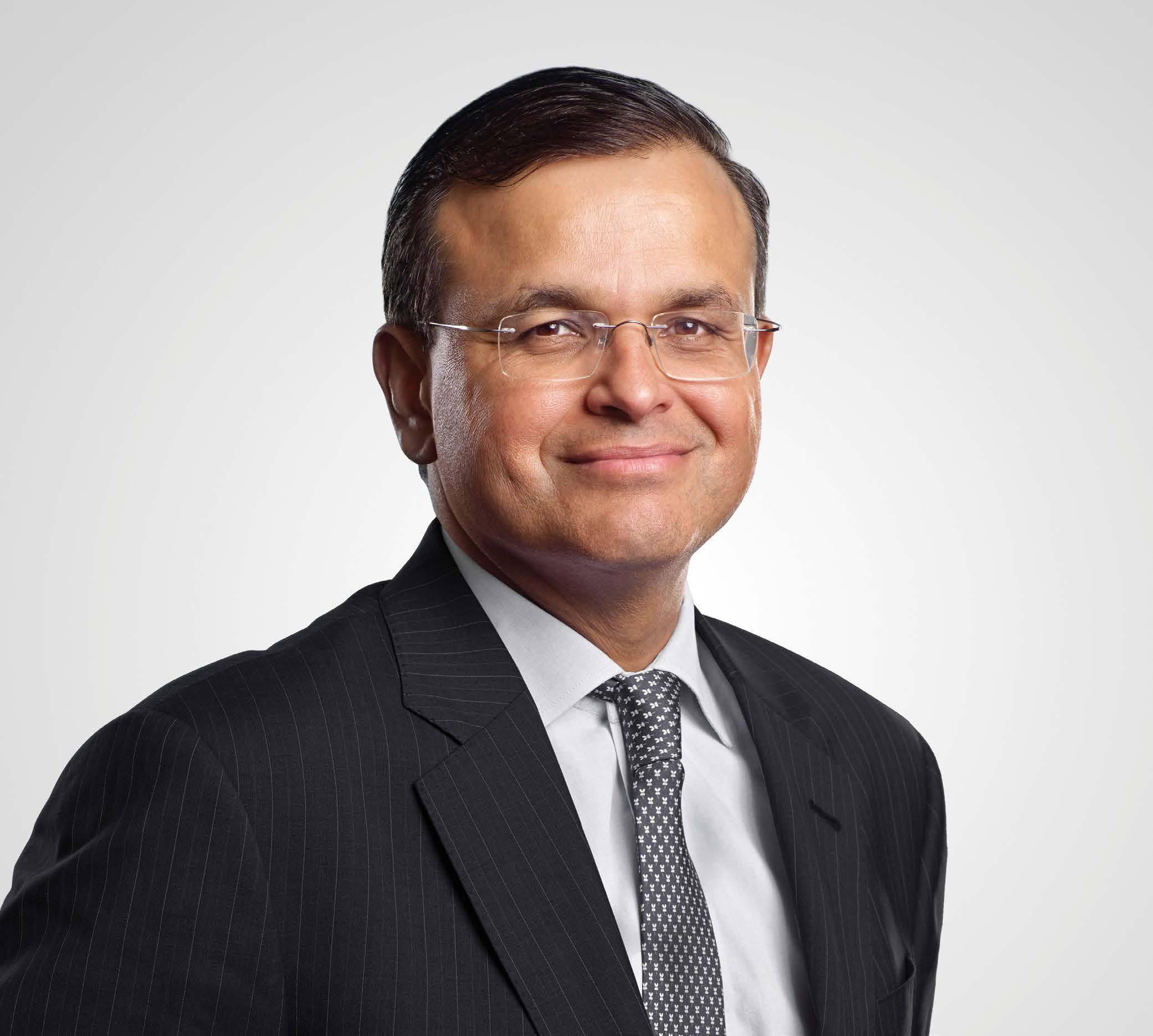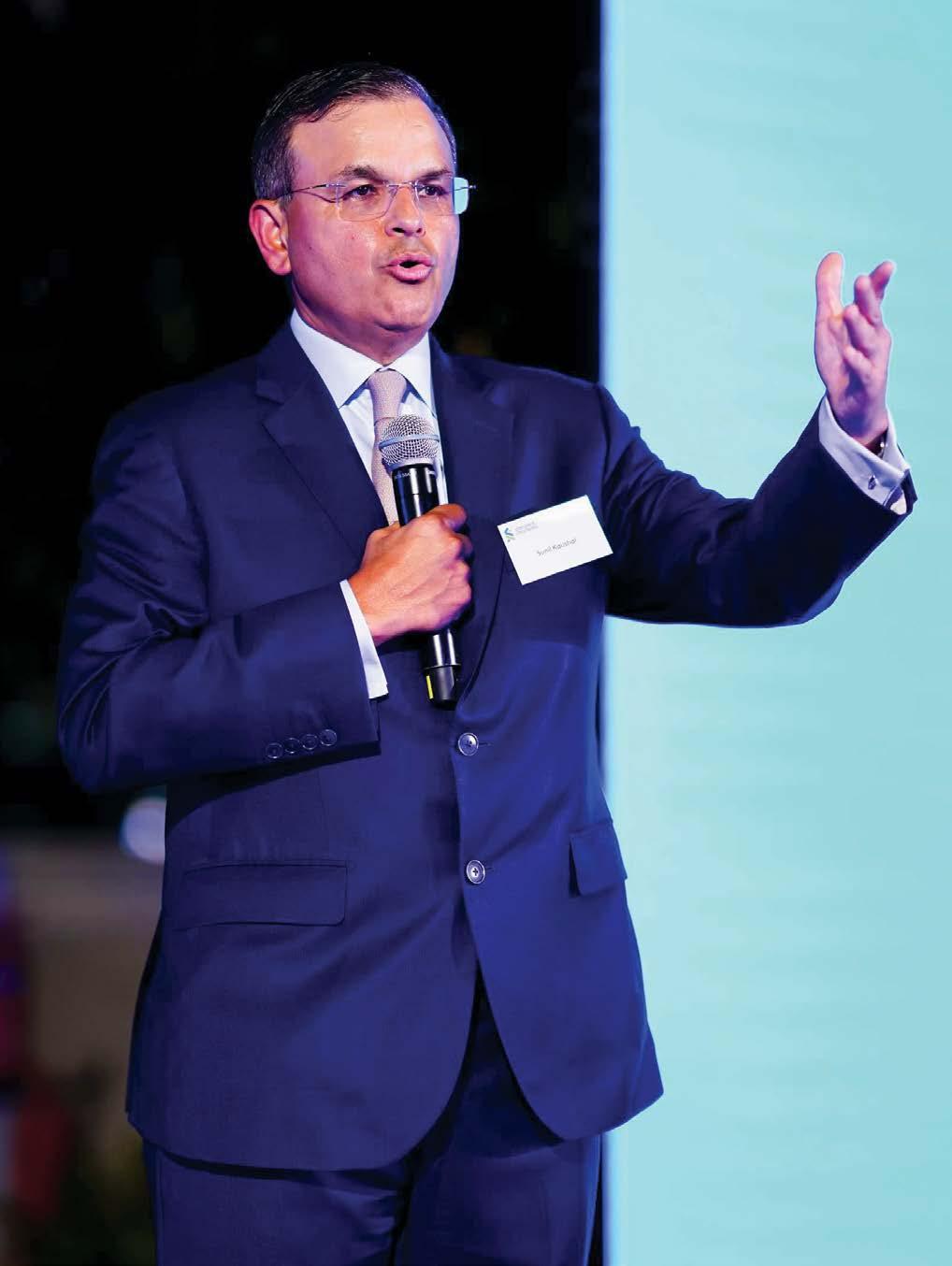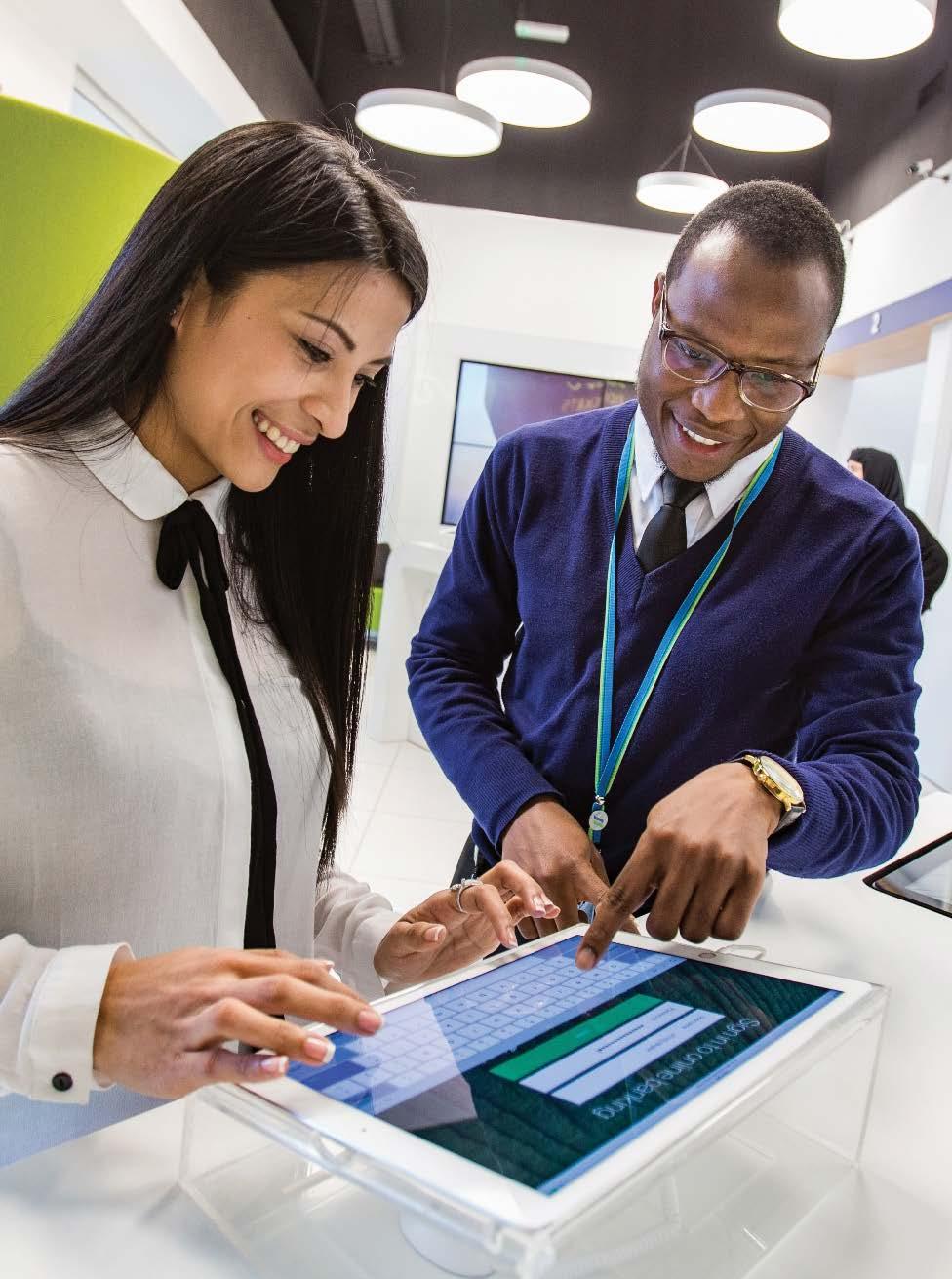
11 minute read
Standard Chartered
takes innovative and sustainable approach to bridging capital and trade in MENA
Regional CEO Sunil Kaushal asserts lender ‘keen to unlock paths to net zero’
Advertisement
The recent banking crises in the U.S. and Europe have left many searching for a positive story, and Standard Chartered seems to be just that. With an impressive 7 percent increase in operating income to $2.6 billion, thanks in large part to the exceptional economic performance of the GCC, the bank is making strides in bridging capital and investments with trade through digital transformation. Standard Chartered’s AME region delivered recordbreaking performance, and the bank’s future plans include further investment in financial markets and transaction banking businesses that prioritize sustainable practices.
To gain insight into these plans and more, Economy Middle East had the opportunity to speak exclusively with Sunil Kaushal, Chief Executive Officer of Africa and Middle East Region at Standard Chartered. In this interview, we delve into the bank’s strategies for continued growth and its commitment to sustainable practices.
You said earlier that the GCC markets are optimistic about outperforming global growth. What are your expectations for the growth rates they could achieve? What challenges are they facing this year?
2022 was an exceptional year for GCC economies driven by higher oil and gas revenues on the back of increased energy prices. This has further advanced the GCC’s economic diversification agenda, leading to additional growth in non-energy sectors and has in turn supported numerous initiatives such as the Dubai Economic Agenda (D33) and Vision 2030 in the Kingdom.
The region’s strong capitalization, economic and development strategies, as well as government initiatives to support investment, in addition to the efficiency of the banking sector, will continue to be key positive factors. Saudi Arabia and the UAE will continue to drive their economic diversification agenda, while other countries like Bahrain and Oman look to boost talent competitiveness, FDI and fiscal consolidation. For the private sector in the region in particular, we expect companies to continue to be resilient and perform positively, supported by robust balance sheets, substantial funding and healthy earning profiles.
While we expect growth to remain healthy in 2023, a moderation is likely as OPEC oil production increases are reversed. The GCC region stands out among EM peers for its very low funding needs. Non-oil-exporting economies in the Middle East, however, are in a much tougher position as elevated energy and food import bills lead to financing difficulties. Financing is likely to remain challenging in 2023, although multilateral and GCC support should help countries such as Egypt and Jordan meet their funding needs.
While the region faces a limited impact from geopolitical tensions and tightening monetary policy supported by growth in the non-oil economy and moderate inflation, specific challenges exist and cannot be overlooked. We expect inflationary pressures, uncertain global oil demand and recessionary fears to impact growth mildly for the GCC region, compared to 2022. Non-oil sectors across GCC economies are likely to be tested on their ability to compensate for potential pressures that weigh down on oil revenues throughout the year. While higher interest rates continue to be a challenge, weighing on deposits and mortgage growth, its negative implications may be limited for the UAE given that its property transactions are dominated by investor-led non-mortgage transactions.
Furthermore, the UAE’s liberalization of immigration laws will support domestic demand, boosting population growth. Economic growth prospects in the region will continue to be driven throughout the year by national diversification agendas. However, infrastructure investments such as the North Field gas expansion in Qatar, or giga-projects such as NEOM in Saudi Arabia will require substantial financing to plug investment gaps, where sources of funding are diversified across banks, capital markets and FDIs. As an international bank, Standard Chartered plays an important role acting as a bridge and creating opportunities to access capital from overseas into the region to further support economic growth.
Facilitating trade corridors in the world is another thing that differentiates us as a bank. To this end, we expect world trade to slow in 2023 as pent-up demand moderates and tighter monetary policies curbs new demand. Trade conflicts on account of geopolitical tensions may also affect trade flows in the coming months. The WTO predicts that global merchandise trade will grow by a modest 1 percent in 2023, down from 3.5 percent in 2022. That said, world trade could pick up in H2 as growth improves in China, the U.S. and the euro area.
How does growth translate into gains for the bank in terms of retail sales, transactional banking and financial markets?
Strong economic growth for the GCC region and positive government confidence has created a strong sense of optimism amongst the private sector, investors and consumers. Supported by robust economic growth, governments in the region have invested in future economic projects and have taken several measures to incentivise the economy. These investments are targeted toward key pillars of the economy ranging from infrastructure, tourism, ease of doing business, private-sector schemes and citizen benefits.
All of this activity requires significant funding. This is where banks, other financial institutions, and capital markets play an integral role in providing the required financial capital. Banks stand to gain from this surge in economic activity, especially in a high-interest-rate environment. The growth of certain sectors, for example, real estate, strengthens profitability for banks through higher demand for mortgages. In addition, strong government confidence attracts high-quality investors and directs substantial FDI into its economies.
The region’s strong economic performance was reflected in our results for the year, with our underlying operating income of $2,606 million having risen by 7 percent – driven by growth in Transaction Banking, Financial Markets and Retail. As the traditional boundaries between the financial and technology sector continued to blur over the last year, we also listened intently to our customers and invested in transforming our business digitally.


For example, we launched our API platform in Saudi Arabia to better serve our customers and align with the Kingdom’s ambition to be a regional digital hub, and we continue to be a bridge to bring in capital and facilitate trade and investment from overseas. An example of this was in September when we announced $566.4 million of Export Credit Agency-backed Islamic financing for Saudi Electricity Company to support a Saudi-Egypt electricity interconnection project, which allows Saudi Arabia and Egypt to exchange up to 3,000 MW of power.
Our business in the Africa & Middle East region achieved a year of record-breaking performance, recording its highest level since 2015. For the year ahead, we will continue to invest in our world-class financial markets and transaction banking businesses leveraging on the significant opportunities that exist in our region.
Sustainability considerations remain central to our growth ambitions and are shaping the future of banking. We take pride in introducing novel concepts to the market and supporting our clients in executing ground-breaking deals. To cite a few instances, we successfully closed the first carbon credit trade for the MENA Voluntary Carbon Market (“MENA VCM”), launched the region’s first Sustainable Supply Chain Finance program in partnership with Majid Al Futtaim, facilitated the signing of the first sustainability-linked loan by a private company, Landmark Group, and most recently, enabled the region’s inaugural Receivables Financing Facility for Siemens in the UAE.
How would you assess this year’s bond and Sukuk markets in Africa and the Middle East following their strong performance in 2022?
For 2023, we expect the bond and Sukuk markets to remain positive throughout the year. In the Middle East, countries such as UAE, Saudi Arabia, Qatar, and Egypt are poised to remain significant players in the capital markets, particularly in the GCC countries, which are boosted by robust economic growth and a strong focus on economic diversification. This translates into an increasing number of project and infrastructure deals, bolstered by fixed-income issuances by both corporates and governments. However, factors that could potentially limit growth in the market include the fiscal surpluses that these countries have accumulated over the past year, in addition to higher borrowing costs.
Last year, we once again led the region's bond and Sukuk markets.
Last year, we once again led the region’s bond and Sukuk markets, taking the top spot in the AME league tables. In the Middle East, for example, we were proud to support the UAE Ministry of Finance in its inaugural issuance of the local currency treasury bonds worth AED 1.5 billion –the UAE’s first dirham-denominated treasury bond, which was 6.3 times oversubscribed during the first auction. In
Saudi Arabia, Standard Chartered acted as a Joint Active Bookrunner and Joint Green Structurer for the Public Investment Fund’s (“PIF”) issuance in the form of their $3 billion green bond. Overall, it proved to be a landmark transaction, ultimately achieving the milestone of first Sovereign Wealth Fund to issue a 100-year tranche in history and the largest ESG issuance from the region and fortifying Standard Chartered’s position as the leader in the GCC Debt Capital Markets.

For African markets, we expect renewed bond issuance activity, with the market to be conducive to innovation in different areas of the capital markets, whether it is in Sukuk issuances for sovereigns, partial/guaranteed bonds, ESG-linked bonds, as the AME region’s syndicated market for green and sustainability-linked bonds and loans continues to deepen and mature.
The West African region is best positioned for Sukuk issuance, having a well-developed legal and regulatory framework for Islamic finance in general and Sukuk issuances in particular. Countries like Nigeria, Senegal, Gambia and Cote d’Ivoire have already issued domestic Sukuk and hence have the flexibility to tap the market when needed. The North African countries such as Egypt, Morocco and Tunisia have also made the necessary regulatory and legal changes and are ready for issuances.
South Africa too is home to Islamic banks and windows of conventional banks, and having done its debut international Sukuk in 2014, it is well positioned to tap this growing market. The countries of East Africa are at various stages of putting together the necessary infrastructure to issue Sukuks, and once ready, they can also join the growing list of issuers.
On the Islamic banking side, our Saadiq business also performed strongly across its diverse product range and continued to lead the market in innovative deals and transactions. As a result, Saadiq received global recognition as the “best Sukuk Bank” and “Best Islamic Investment Bank” by Global Finance and “Best Islamic Bank for Digital CX” by the Digital Banker. Key highlights include our role as the Sole Sustainability Structurer for Dubai Islamic Bank’s Sustainable Sukuk –the largest by a Middle East financial institution in the international capital markets since 2021. This was in addition to our role as one of the joint lead managers and bookrunners on Sharjah Property developer Arada’s $100 million Islamic bond deal after it tapped into an existing $350 million Sukuk that was issued and listed on the London Stock Exchange in June.
Saudi MCIT and Huawei sign ICT MOU
You showed excitement about the magnitude of the opportunities across the region. In which sectors do you see opportunities for growth and investment?
The growth we are envisaging in the Africa & Middle East region in the next five years is significantly higher than the growth we have had in the past five years. We are wellpositioned to tap into these growth opportunities, and also alongside accelerating our commitment to digitization and sustainability while also focusing on simplifying the business.

Africa is closely watched as the next big growth market –a description that has persisted for a while. The continent boasts the world’s largest free trade area (a market of 1.2 billion people), is the fastest urbanizing continent, and is home to some of the youngest populations in the world. The medium to long-term trajectory remains positive as today’s African citizens continue to build an enabling environment for the future. Sustainable economic development is core to the ongoing success of the continent.
Africa continues to create a digital ecosystem which is particularly crucial as a multiplier of growth, as access to smartphones and other devices enhances consumer information, networking, job-creating resources and even financial inclusion. Countries such as Nigeria, Egypt, Kenya and South Africa are powering the fintech industry in Africa, which is already an established global leader in mobile money. As a result, we see significant opportunities for collaboration and innovation through digital banking, ecosystem banking and blended finance to attract and direct additional capital to our markets.
In the Middle East, we are increasingly seeing markets diversifying their sectors. For example, the UAE is accelerating the country’s industrial sector transformation into a global manufacturing hub. Saudi Arabia, as part of its Vision 2030, continues to grow as a large attractive market that will continue to open and encourage private sector participation thereby enabling our global and regional customers to have the opportunity to participate in sectors like healthcare, education, entertainment and infrastructure.
The growth we are envisaging for the AME region in the next five years is significantly higher than the growth we have had in the past five years. We are well positioned to tap into the long-term prospects in the region – accelerating our commitment to digitisation and sustainability and redirecting our priorities on the most significant opportunities for growth while also focusing on simplifying the business.
You are involved in several green finance projects, the latest of which is the NEOM Green Finance Company. What is your program in this regard in a year that will witness the UAE hosting COP28, especially since the green concept has become inherent in almost all services and products, from green loans to green deposits, green investments, and others? Who do you think is the most prominent country in the region issuing green bonds and Sukuk? What will its future be?
As the effects of climate change continue to grow, as a bank we are keen to innovate and unlock paths to net zero. We must foster sustainable development which also creates a significant growth opportunity for the financial sector.
When we look at the Middle East, the UAE has made significant progress toward sustainable development. The UAE has closed some notable deals in the ESG segment such as First Abu Dhabi Bank’s green bond issuance, and the DP World’s green revolving credit facility, for which Standard Chartered was the Green Loan Coordinator.
In 2021, the Bank launched the first transition Sukuk, the landmark $600 million Sukuk facilitated Etihad to align with the United Nations Sustainable Development Goals in its carbon reduction targets, by investing in the next generation of fuel-efficient aircraft and developing the use of biofuels. In addition, Saudi Arabia will continue to be a major player in this segment. For example, we have successfully completed the first carbon credit trade for the MENA Voluntary Carbon Market (“MENA VCM”). The underlying transaction involving our key clients in the Kingdom is a clear demonstration of the promising potential of VCM markets globally. As announced by The Public Investment Fund (“PIF”) in September 2021, the MENA VCM is a core pillar of Saudi Arabia’s efforts to reach Net Zero by 2060.
In March 2022, five leading Saudi Arabian firms including Aramco, SAUDIA, ACWA Power, Ma’aden and ENOWA (a subsidiary of NEOM) joined the initiative as the first potential market partners. It’s likely that we will see demand grow as investor confidence in the region’s ESG credentials increases.
In addition to green instruments, it is important to recognize the role of regulators in this market. By providing guiding principles and the appropriate support, they can deliver a framework for the market to continue to grow. There are four key areas that regulators should consider: creating certainty, encouraging collaboration, facilitating awareness and fostering innovation. Supporting the provision of these should be a focus for market participants so that they can be confident in the long-term health of the market.
Ahead of COP 28 this year, we remain committed to integrating environmental and social considerations into our decision-making while supporting the massive shift of capital toward sustainable finance, which has become a priority for investors, companies, and individuals.
Are you combining Fintech, AI and potentially Web3 into your digital banking offering?

At Standard Chartered, fintech partnerships are powering our digital-first banking services that address diverse client needs. These partnerships and new capabilities have helped clients to connect quickly, easily and seamlessly to banking services while improving financial access for their clients and suppliers or other ecosystem members such as institutional investors.
A strong model for an effective bank-fintech partnership involves identifying complementary skillsets and mutually supporting areas of expertise and capabilities that combine into unique value propositions. The resulting propositions, stronger than what a bank or fintech could deliver on its own, aim to solve practical problems and advance strategic objectives for clients and markets. A partnership approach accelerates client access to that innovation. Meanwhile, banking clients can take advantage of the stringent due diligence that banks bring to vetting their fintech partners.










